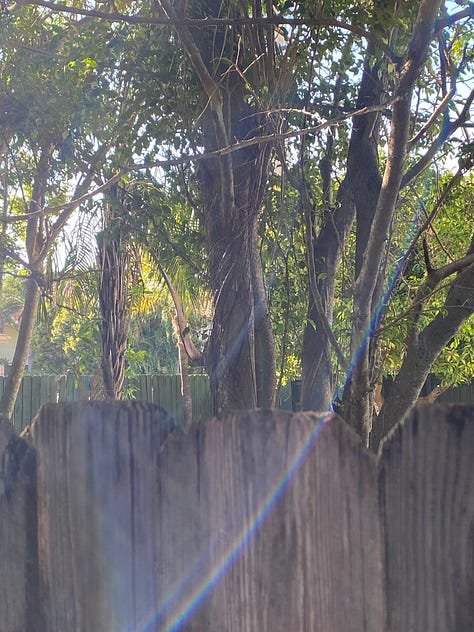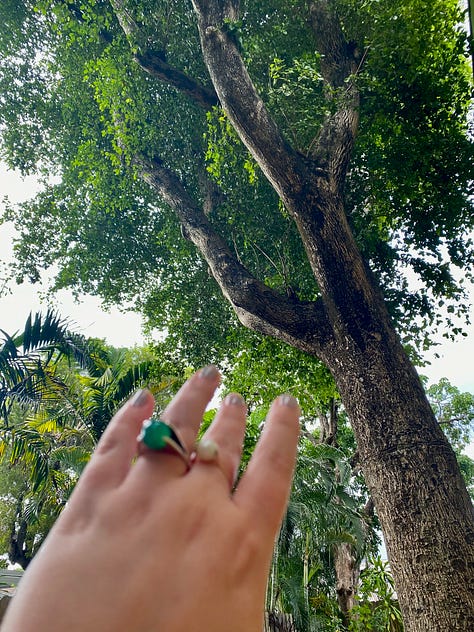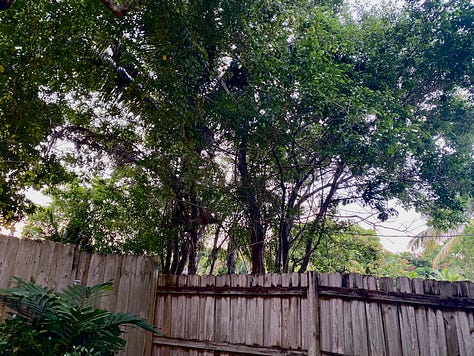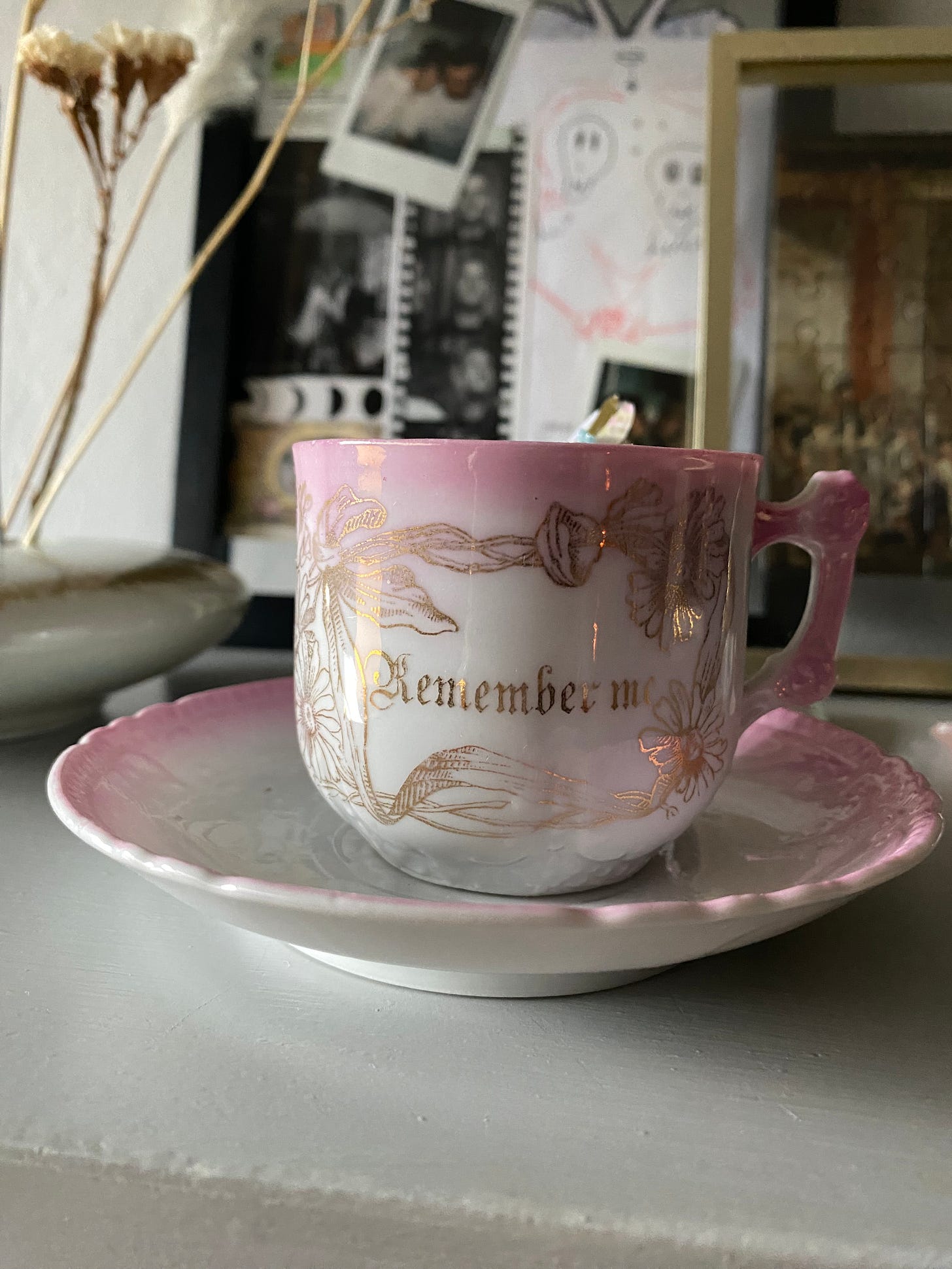There’s a peculiar ceramic plate that sits in the Museum of London.
It’s noted to originate from the 17th century and was said to be found in a local London sewer.

The cheekiness of this plate is that it almost seems like it’s speaking to you. You and I, it says. It’s made from Earthenware ceramic so it quite literally is from the Earth.
I remember once hearing how Jane Goodall said that when she travels to conferences or for speeches and tours she’s often in large, chaotic metro areas and put up in a hotel. She mirrors back to nature in her hotel room by looking out the window and orienting to a tree, a plant, a bird, a flower. Like locking eyes with a sympathetic loved one when you’re off-kilter, in doing that, she’s steadied and rooted again.
This visual has always stuck with me and was a turning point for when I stopped wishing myself to be elsewhere “in nature” — somewhere better, greener, less crowded, more spacious.
At the time I heard this, I had a bedroom window on the ground floor of our apartment. I looked out of it at the gorgeous green trees careening down toward me. I noticed the iguanas, the size of small dogs, languorously crawling by on the fence. There was a whole universe right in front of my nose and I didn’t even have to walk outside to witness it.



We were living in a warehouse district at the time. We had no grass anywhere in our apartment building, and when I began tapering Lexapro I wanted nothing more than to touch grass.
I would walk down the street to this little duplex that had some. When the owners weren’t outside I would leave my shoes on the street and stand in their yard barefoot. Instantly I would feel my system settle into the ground… like etheric roots spreading from the base of my feet, dropping 15-20 feet down into the Earth… I was connected.
I wasn’t resentful of not having “my own” grass. I was just so thankful to have any at all. This led me to explore the little enclosed space that we did have in our apartment complex. A wooden fenced-in backyard laid with brick and a single tree (albeit, enchanted and massive) square in the middle.
I familiarized myself with the tree. Slowly, in time. She was watching me and I knew it. I would come outside to orient, to steady my nervous system from the panic and unrelenting despair I was wading through at the time. I asked nothing of her — we would just be together, the two of us, grounding. Cultivating a relationship with a piece of earth has been… profound for me. That tree became my teacher, my co-regulator, and my friend.
My time spent living in Tokyo and New York, in little boxes on top of each other, were filled with so much time observing the natural world around me, wherever and whenever I could see it, that I never felt deprived in the city.
Central Park after class, my head on my jacket as I lay under a tree. The Jackie O reservoir right outside my first sublet bedroom apartment. Small gardens and shrines all over Tokyo, wet moss growing over parking lots. Hot springs and an island just a train ride away. How could I forget such an important truth?
To see a World in a Grain of Sand
And a Heaven in a Wild Flower
Hold Infinity in the palm of your hand
And Eternity in an hour | William Blake
There’s a canal across from our new front door. We can't swim in it, but there's a whole universe inside.
A blue crab, catfish, old metal parts sunken from decades past and overgrown with lichens. I stare into a piece of nature until the subtle universe of it lights up for me. We don't need acres of land (if that's not accessible to us) to be "in" nature.
We are nature — we are never separate from it. Ever.
I try not to overwhelm my system with influencers who own tons of land and massive properties. I don’t let it get me and my apartment/ tiny home living down. I practice staying rooted, connecting to the very pieces of earth I have in front of me.
I watch it speak to me in whispers, inviting, unfolding.
First You Do The Practice, Then The Practice Does You
I think back to a quote by Hazrat Inayat Kahn who explains that spiritual seekers living aloof in the Himalayas away from society and “real problems” are the opposite of what great masters have always done — live among people and the “problems of the world.”
For novelists, it seems beautiful to describe masters as living in caves of the Himalayas or moving about in the forest somewhere where we cannot go and find them, always keeping aloof and apart so no one can reach them. But every soul has a divine spark, and therefore if there is any stage of human evolution, it is for human beings — not for those outside the human world. If masters are outside the human world, there is no relation between us and them.
The great spiritual souls that have lived in the world, in the midst of the world, have proved to be the greatest masters. What is the use of those holy ones who never experience from morning till evening the tests and trials of the dense world, where at every move there are a thousand temptations, a thousand problems?
What can those who are outside the world do for us who are exposed to a thousand difficulties at every moment of our lives? No, the mastery, the holiness, the evolution must be shown here. | Hazrat Inayat Kahn, The Art of Being and Becoming
It makes me think about the parallels of wanting to just be plopped in a forest away from humanity and how that isn’t necessarily the way to experience true nature.
Sounds ironic, I know. But humans — and all of our complexities — are indeed nature.
When we cut ourselves off from those complexities in exchange for an “idea” of something (peace, tranquility, spirituality, space, “more nature”), we are missing the point, I think.
Of course, we can and will have preferences. And that’s wonderful — it’d be terribly boring if we were all the same. Some people prefer a slower pace of life, gardens, no neighbors, lots of land, on and on. Some like city life with lights and great food and a hum and buzz of electricity. Some like a mix.
When we are aware of our deeper preferences and why we have them, they can be authentic and fun to engage and play with. If we delude ourselves with false desires, and what we think we should have/do/be, this is where we might get trapped in distortion and prevent our beings from evolving and exploring.
I remember Seth Lyon giving a lecture on this very topic in regard to the nervous system. For over a decade he lived in a nature-centred community, meditated daily, etc. Really, his entire nervous system was a wreck — he was “transcending” away a lifetime of subtle abuse. He thought city folk were just deluded yuppies evading the red pill and being screwed by the government. He couldn’t go to a grocery store without being lit up, activated, untethered.
In those moments, what’s the point of practicing all this “peace” for years on end if you can’t even be in a Walmart?
When our systems are deeply overwhelmed by being with people or in crowded spaces for short periods of time, (and I know this well — it’s still a challenge for my nervous system at this stage) we are not fully in the world. Thus, we cannot yet experience the world fully because our nervous system capacity is still growing or just simply overwhelmed.
Similarly, if we thrive off of chaos and extreme busyness in the hustle and bustle of the world (I have also been there and understand this well — hi, NYC), our capacity within our nervous system is also very low — It’s so close to the tipping point where one bad thing will cause a rupture. Or it’s in a deep freeze, not allowing us to slow down and process the stressors of daily life until one day, it all falls apart.
I think there’s a middle way.
A system able to be in the fallow periods, to slow down and “winter,” to be connected to the earth surrounding us, and to also be in yang energy, in a bit of chaos, around people and bustle, and process it effectively. A natural ebb and flow of the system, with nothing getting stuck and stagnant.
As for me, I’m at the beginning of this work and growing all the time. I know I will forever be leaning into this great dance.
Seasons
The idol worship of spring and summer
Always in bloom
Fresh green grass
Sun on bare backs, sweat pooling in pockets of skin
Leaps into fresh water
Glistening dew drops winking back at us.
The shadows of spring and summer live on, too.
Exhaustion. Overproduction.
Endless yang, eternal heat
Sun drunk. Dehydration. Overstimulation.
Always on, always going
Living in eternal summer is what we see every day — it’s what is prized.
People leave their literal homes in winter to head to a sunny spring and summer somewhere else.
Someone posting daily on social media — content, concepts, continuation, repeat
Corporations open 365, with new items to buy every week
Fruitfulness, bloom after bloom.
We are never bored. There’s always a goings-on in the world wide web, in television, in consumption.
But I want to ask,
Can we bow our heads to winter?
To the great mystery and carrier of death?
To the fallow periods of deep unknowing, of less light, of resting and letting go?
Perhaps we praise summer because ancestrally, winter brought us death and scarcity
But can we remember those periods with reverence and respect, too?
Of less work. Often, no work. The work was in the home — a metaphor and a reality.
Internal.
Through my long winter, I’ve learned the true ways of s l o w.
Not “slow living” we see on social media equating to journaling and prancing in a meadow
But a deep slowness that came to me through a death of self.
Pain, fear, trauma release, and finally, integration.
Winter. Transformation.
Everything about me is slower now.
I walk slower. I talk slower. I react slower
My voice sits at a lower register. My laugh, deeper
I respond to messages more slowly. I eat slower, feeling physically sick if I eat at the pace I used to.
As the magnificent Pilar Lesko said,
“You thought you needed a feast — you didn’t know you could be fed by a morsel.”
The wisdom of scarcity. The gift of the fallow period. The shamanic carrier of equinox and autumn, the winter wisdom carrier of death and rebirth. A foot in both worlds.
I live in a physical place of eternal spring and summer (Florida)
I’m in a spiritual place of autumn and winter (for well over a year)
I’m caught in a continuum of
connecting
the inner
and outer
and leaning into their endless offerings, the dance of these great polarities; their messages *swirling above me like a song
Or a great storm.
*Line adapted from a “Widening Circles” by Rainer Maria Rilke.
Our Things Outlast Us
In moving to a new apartment last month, I’ve found myself tracing my hands over every single thing I own. I’ve also fallen into the notion of stewarding what’s mine at this place in time. Nothing is ours forever.
In our last apartment, while it was very old and run down, I swapped all the cabinet knobs for something more modern and sleek. Nazar, my brother, and I painted the apartment a greyish blue making it look more spacious, bright, and crisp (whites look muddy in a space with low natural light). We painted the door and the trim with Rustscat, making the whole space look so much pulled together. Clean.
A few years ago I purchased an antique console at Goodwill for $25 that still had (almost) all the original brass hardware. Someone had painted it ripe avocado green and it wasn’t cute. To strip all the paint and bring it back to it’s natural wood was the dream but since I didn’t have the proper tools or safety precautions I sanded it down and painted it blue-grey and removed and polished all the hardware. She sang out brilliantly from the wreck of time.*
I’m sure so many of you have stories of tending to things of eras past with love, reverence, and adoration.

When I look at the teacup my grandma Ruby gave me, one that was given to her father when he was in primary school in the 1890s, I’m reminded wholly that,
our things outlast us.
We buy things, we find them, we inherit them and then we leave our earthly bodies while these objects remain. You’ll pass them on to your children, who will also leave their earthly bodies, and that dresser will stand tall, the 200-year-old tea cup on top of it, porcelain glistening.
One of my teachers recently did a talk on the idea of “planting gardens in places you know you will leave.” Tending. Caring. Stewarding. Simply because even though you know you will leave. That home, that climate, this earth.
She mentioned being in relationship with the places and spaces we are in, even if we don’t like them. And how being in relationship to something is where honor begets transformation. Tending begets a purely present appreciation. These moments build a life.
Erin Boyle, a fellow renter of a small apartment and the one who reminded me of such a simple truth, wrote an endearing essay on our things outlasting us. She writes,
When I write about making small improvements to my apartment, I’m sometimes tempted to use the phrase, “a sense of ownership” to explain why I’ve tackled one project or another, but the phrase isn’t exactly right. I don’t need to own something to be able to care for it and there’s value in caring for a place even if it’s not mine to keep. In an essay on family heirlooms in my book, I wrote: “The simple fact is that our stuff outlasts us.” Same too for the places we call home. Whether we own a place, or rent it, we’re keepers of the places we live in for such a relatively short time.
Like the 17th-century plate in a sewer, objects outlast us. And someone cared enough to pluck it from the intestines of the city and tell someone about it.
Earth: the metaphor for home. We are Earth. Our souls, however, are in the world, but not of the world.
We will leave here. We will leave home. What will remain is what we cared for. The gardens we left behind. The thousand-year-old cathedral we guarded and stewarded. The relationships and people we tended to. The objects we held in our hands, cradling them gently like a pile of sand, time slipping through our fingers with love.
Tending,
Tracy
*And I add my own love to the history of people who have loved beautiful things, and looked out for them, and pulled them from the fire, and sought them when they were lost, and tried to preserve them and save them while passing them along literally from hand to hand, singing out brilliantly from the wreck of time to the next generation of lovers, and the next. | Donna Tartt, The Goldfinch







